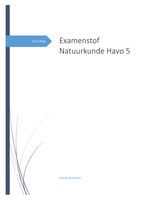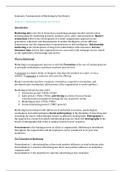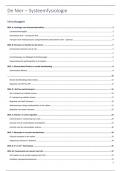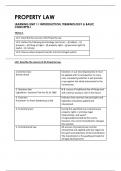Valuation
AEP 32306
Guiding Questions (+Answers)
Anneli Janzer
, Week 1
Welfare measures/Discounting
Reading Questions
• What are the steps in the public decision-making process according to Romijn & Renes? (Be careful
not to confuse them with the steps in a CBA!)
• In which steps is CBA commonly
applied? How is it used in these steps?
o Step 4: the proposed plan is examined to
determine whether it still provides a
solution to the problem and whether it
can be adapted to improve its efficiency
and/or effectiveness. Ex ante
evaluations, including CBA, play an
important part in this evaluation and
seek primarily to identify and describe
the effects of the proposed measures and
any possible course corrections.
• What is meant by a baseline alternative?
o =What happens, if we DO NOT
implement a policy
• What are incremental costs and benefits?
o Costs and benefits that would occur if a
particular course of action is taken,
compared to those that would have been
obtained if that course of action had not been taken.
o An incremental cost is the difference in total costs as the result of a change in some activity.
Incremental costs are also referred to as the differential costs and they may be the relevant costs for
certain short run decisions involving two alternatives.
• What scoping choices does one need to make when preparing a CBA?
o Political, temporal and societal
▪ Decision maker, baseline vs policy alternative; limited (natural) life span vs infinite life span
(e.g. policies) and discounting (longer time horizons matter less)
• What are the main differences between a financial (or private) CBA and an economic (or social, or
environmental) CBA?
o Financial: only maximizing profits (money)
o Economic/social: larger economy and other stakeholders
• What is the difference between the inflation rate, the interest rate, and the discount rate?
o Discount rate=rate of interest; used in the calculations of the future cash inflows and outflows
Used to determine the value of certain future cash flows today
Used by insurance companies and the pension plan companies to discount their liabilities
o Interest rate= the rate charged on the principal amount by the bank, financial institutions, or other
lenders for lending their money to the borrowers
o Inflation rate=percentage at which a currency is devalued during a period (as the consumer price
index(CPI) increases); a rate at which the currency is being devalued causing the general prices of
consumer goods increase relative to change in currency value
• What is the difference between the real interest rate and the nominal interest rate?
o See “concepts” sheet
• The literature gives two reasons why we discount future costs and benefits. What are those reasons?
o We value money in the future less than today. We rather have benefits now than in the future.
Costs in the future are also not valued as much as today, since things can change and probably only
the future generations will have the burden of the costs
• The CSF video gives a third reason why we discount future costs and benefits. What is that reason?
o There is a greater value of having sth now than in the future
o Having money, goods or services earlier lets you do things with it that may increase its value to you







